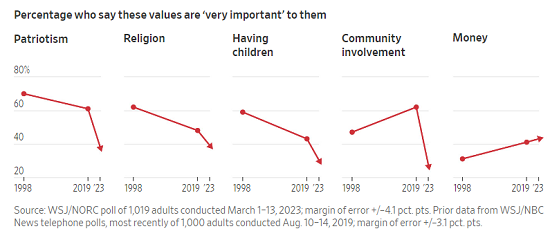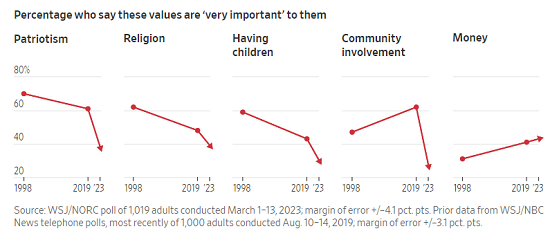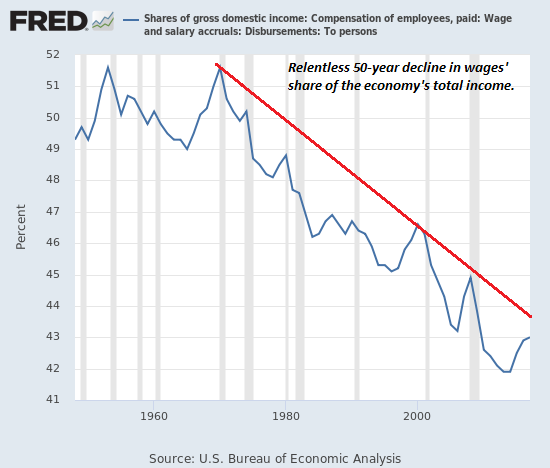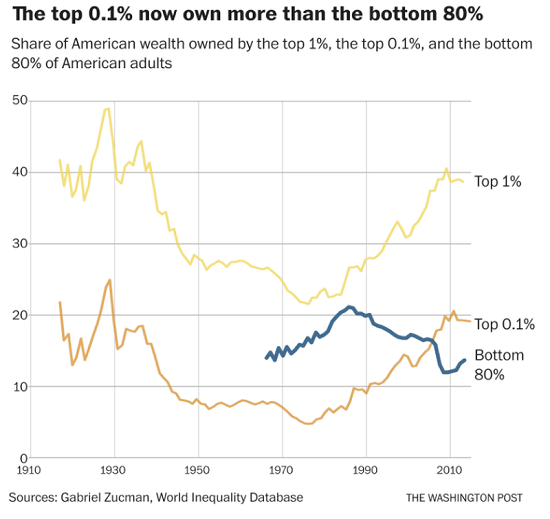
The market and the government will continue to promote and support a neofeudal status quo up until they are forced by society to bring back the common great and chance.
Of the 3 main characteristics of human venture– the marketplace, government and society– we focus almost solely on the very first 2. Society is hardly ever thought about as a force of its own. It is implicitly viewed as reactive to the marketplace economy and government, the churning wake left as the marketplace and government chart the course.
Simply put, society is secondary to the economy and governance, the place of styles, patterns, home entertainment, culture wars, and so on, fodder for media and social media, a reflection of what’s occurring in the market and federal government.
As I describe in my book Worldwide Crisis, National Renewal, this is a misunderstanding of society’s function as a force that changes the economy and governance in extensive ways.
We give social change brief shrift because it’s not easy to study or comprehend. Social change is amorphous and does not lend itself to metrology like the market or the legal structures of government policy. We end up counting on photos such as viewpoint surveys that are naturally restricted in scope and precision. Respondents tend to provide answers they think are anticipated or show their views of the minute. Other data is collected from groups that are self-selecting.
In spite of these constraints, it’s clear that American society is unraveling and going through profound modifications that will ultimately upend markets and governance. We will concern recognize society is changing markets and governance, not the other method around.
Charts of the stock exchange and economy in the 1960s do not show the social changes in values that made the 1960s so tumultuous and substantial. 3 social movements– civil rights, the environment and women’s rights– all changed the economy and governance in the 1970s, letting loose forces that continue to shape our economy and government to this day.
The marketplace and government didn’t lead these modifications, social forces altered the market and government. The market and government were completely happy to maintain the status quo of rampant commercial contamination and systemic limitations of civil rights. Society required economic and political modification: the government was forced to enact ecological guidelines restricting contamination and hazardous waste, and enact legislation eliminating barriers that imposed an oppressive, unfair, two-tier society and economy.
In the 1970s, these ecological, females’s rights and civil rights advances forced on the marketplace and federal government transformed the economy for the much better. Women entered the labor force en masse and women and minorities got to organizations that had actually formerly excluded them. Environmental and efficiency policies transformed the American economy and landscape from an industrial disposing ground to a much cleaner, more sustainable, more efficient and productive industrial base.
I discussed this just recently in The Forgotten History of the 1970s and The 1970s: From Rotting Carcasses Floating in the River to Kayak Races.
Much work stays to be done, naturally, however much has actually been accomplished by the citizenry concluding the status quo is no longer acceptable.
In my analysis, the nation’s social material is unraveling due to the breakdown of civic virtue, social cohesion and the social contract. The supremacy of finance (hyper-financialization) and corporate self-interest (hyper-globalization) has fatally weakened civic virtue, social cohesion and the social agreement. Instead of the marketplace serving society, society now serves the market and financing in a painfully apparent two-tiered neofeudal structure in which the couple of gather the large majority of the wealth and political power.
Securing vast personal wealth is now the Prime Regulation of the elite, an elite which in previous generations comprehended that every elite eventually serves at the behest of those they rule (i.e. consent of the governed), and so the elite must use a few of their wealth and power to pursue the typical good rather than their own self-interest.
Skyrocketing wealth-income inequality leads to vast concentration of political power. “The people” rule in name only. Any effort to end the two-tiered neofeudal structure of our economy at the ballot box is futile.
When it comes to the social contract of level playing field for all, in the real life, the rungs in the ladder of social mobility have actually been broken. Those who bought houses and properties a generation or 2 ago have obtained wealth in a credit-asset bubble economy, while those who obtained a fortune for a college degree find the value is uncertain or limited in all but the top-tier of credentials– and connections still matter.
The net outcome is individuals are dropping out, opting out or burning out. This is the outcome of what I call social defeat: the odds are now stacked versus all however the super-achievers and the well-connected. Given the instability and inequality of the financialized, globalized “market economy” (heh), a family and house run out reach financially for many, so they quit. Others see their hard-won gains erased by medical expenditures (the leading reason for household bankruptcies) or a collapse in the speculative bubble-du-jour. We see the exact same trends in stagnant economies in other places (Japan, for instance): the decrease of marriage, household and having kids and the abandonment of social/ neighborhood ties.
As this Wall Street Journal poll exposes, the standard forces of social cohesion are collapsing before our eyes. As Peter Turchin has actually described, social cycles of combination and disintegration happen every 50 years or two. In integrative stages, people find reasons to comply. In disintegrative phases, individuals find factors to disagree and piece into dissentious, polarized camps. Plainly, we’re well into a disintegrative phase, and what might bring us together is not even noticeable.
America Draws Back From Worths That Once Defined It, WSJ-NORC Poll Finds (WSJ.com)
The increasing emphasis on money reflects the insecurity and instability that identify the economy. If history teaches us anything, it’s that piling up private stashes of wealth can’t buy social cohesion, restore the social agreement or reconstruct social ties. Speculative gain is the ultimate false god. The belief that if all of us barricade our own personal wealth, whatever will be fine is the acme of social dissolution.
We have an excellent chance for national renewal, however there is valuable little in the market or governance that offers commonalities. The common ground must be discovered in social modifications in what we value and what is no longer appropriate. The marketplace and the government will continue to promote and support a neofeudal status quo until they are forced by society to restore the typical great and opportunity.





New Podcast: Chaos Ahead As We Go Into The New Age Of ‘Deficiency'( 53 min)
My new book is now readily available at a 10 % discount ($8.95 ebook,$
18 print): Self-Reliance in the 21st Century. Read the first chapter for
complimentary (PDF)Read excerpts of all three chapters
Podcast with Richard Bonugli: Self Dependence in the 21st Century (43 min)
My recent books:
The Asian Heroine Who Seduced Me (Novel) print $10.95, Kindle $6.95 Read an excerpt free of charge (PDF)
When You Can’t Go On: Burnout, Numeration and Renewal $18 print, $8.95 Kindle ebook; audiobook Check out the first section free of charge (PDF)
Global Crisis, National Renewal: A (Revolutionary) Grand Method for the United States (Kindle $9.95, print $24, audiobook) Read Chapter One for free (PDF).
A Hacker’s Teleology: Sharing the Wealth of Our Shrinking Planet (Kindle $8.95, print $20, audiobook $17.46) Read the very first section for free (PDF).
Will You Be Richer or Poorer?: Earnings, Power, and AI in a Traumatized World
(Kindle $5, print $10, audiobook) Check out the very first section totally free (PDF).
The Adventures of the Consulting Theorist: The Disappearance of Drake (Novel) $4.95 Kindle, $10.95 print); checked out the very first chapters free of charge (PDF)
Cash and Work Unchained $6.95 Kindle, $15 print) Check out the first section free of charge
End up being a $1/month patron of my work by means of patreon.com.
NOTE: Contributions/subscriptions are acknowledged in the order got. Your name and e-mail remain private and will not be provided to any other private, business or agency.
|
Thank you, Matthew W. ($108), for your outrageously generous contribution to this website– I am significantly honored by your steadfast assistance and readership. |
Thank you |
, Cathy L. ($54), for your marvelously generous contribution to this website– I am considerably honored by your assistance and readership. |

